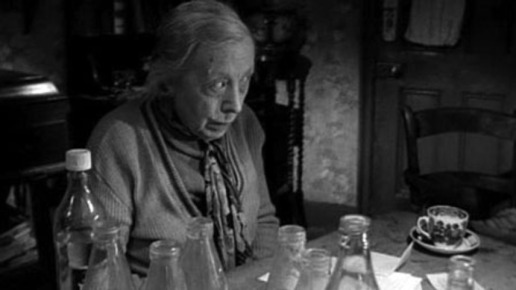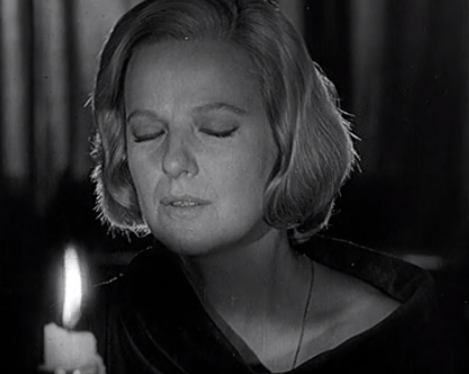Mrs Ross (Edith Evans) is a dotty old bat prone to hearing things whispering.
“The major problem of old age is loneliness. Many old people live entirely alone, unvisited and unwanted, living day in day out in small rooms without company or friends” sneers politician on radio “Poor souls” says Mrs Ross. Deluded see.
As true then (1967) as it is now (2014) And even more so. The longer people live the lonelier they get. And they – we – are living longer now. So we’re all getting older, and lonelier, and sadder. We’re all Mrs and Mr Ross’s now. Oh dear.
Mrs Ross is the poor soul. A deluded poor soul. She’s going to get duped, she’s going to get dumped, she’s going to get deserted.
As a grim depiction of the nitty gritty degradations of old age the film has worked ok. Here is lovely Nanette Newman telling Edith Evans to sod off. So she sods off. And then finds a parcel of loot (hidden by good-for-nothing son) in the wardrobe.
Mrs Ross has crumpled into childlike childishness. Edith Evans acts her funny hat off. She does verge on the edge of mad-as-a-hatter caricature at times (as seen in that clip for example). I couldn’t quite get my empathy engaged with or by her old-style (old fashioned?) theatrical performance.
I mean its good acting, in that its good “acting”. But bad acting in the sense that you see it more as “acting the part” rather than being the person, the Mrs Ross she’s supposed to be being.
Some of these supposedly “great” theatrical actors I often see performing their roles as if from behind, (there still as Edith Evans, John Gielgud etc) manipulating the strings, rather than being inside the character, invisible, transparent. Maybe this is something to do with the kind of over-projection that works better in a theatre, but isn’t so successful in a small frame, as a film, as cinema.
The third act flops into farcical melodrama. Bryan Forbes (director) has tried to inject some pace and drama into the downbeat mood, lift its entertainment value for a commercial audience. So in gets thrown some gangster chasing and capering about involving Mr Ross, the slimy husband who’d dumped his wife. Poor Mrs Ross gets left behind, or left out while he’s doing all his dodgy dealing. Then he abandons her again.
But she returns at the end. Back to the Social (to ask for assistance). Back to the library (to warm her feet up on the radiators). Off to church (to sing hymns with all the other God-Forsakens) All the usual refuges of the unwanted, the poor, the old, the lonely, the sad, the unloved.
Despite my fixation with everything 1960’s black and white don’t think I’ll bother keeping this film.
Dir: Bryan Forbes, UK
5.5/10



